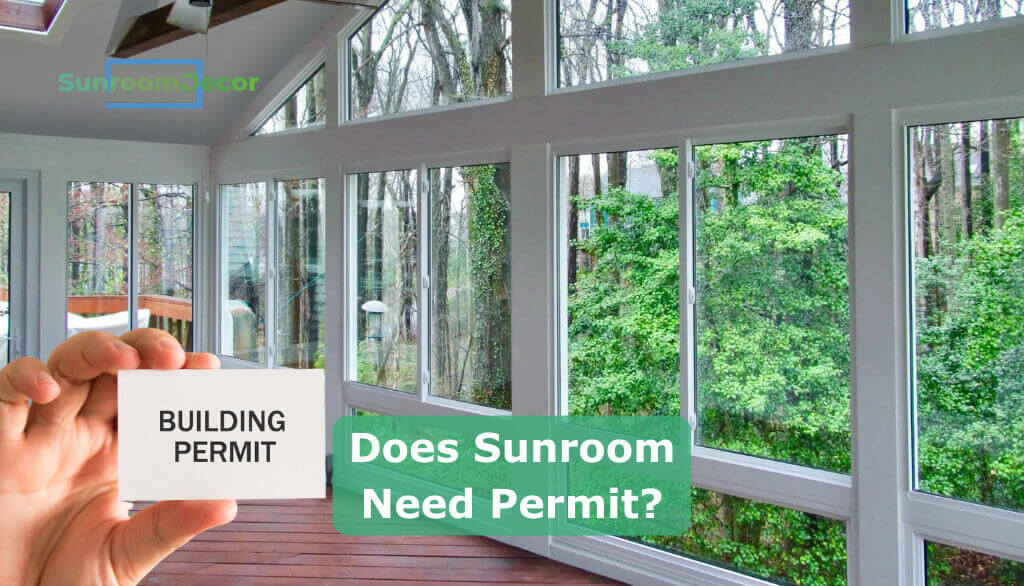Adding a sunroom to your home is a great way to increase its living space, add natural light, and create an indoor-outdoor living experience. When it comes to building a sunroom or any other type of home addition, homeowners often wonder whether they need a permit.
The short answer is yes, in most cases, a building permit is required. A building permit is an official document issued by the local government that allows a property owner to begin construction or renovation of a building or structure.

The Importance of Building Permits for Homeowners
A building permit is a legal document issued by your local building department that allows you to begin construction on a building or home improvement project. Building permits are required to ensure that the construction is done safely and meets local building codes and zoning regulations.
Building without a permit is not only illegal but can also result in serious consequences. If a homeowner is caught building without a permit, they may face hefty fines, penalties, and legal problems. In addition, the lack of proper oversight during construction can lead to safety issues that can harm both the homeowner and future occupants of the home.
Building codes and regulations vary from one jurisdiction to another, so it’s important for homeowners to check with their local building department to determine what type of permit is needed for their specific project. Typically, a permit is required for any construction that involves structural changes, electrical work, or plumbing modifications. This includes the installation of a sunroom, as it typically involves the modification of the existing structure of the home.
Obtaining a building permit involves submitting plans and specifications for the proposed construction project to the local building department for review and approval. The department will then review the plans to ensure they meet all relevant building codes and regulations. If everything is in order, the department will issue the permit, and the homeowner can begin construction.
It’s worth noting that obtaining a building permit can take some time and may involve additional costs, such as permit fees and inspection fees. However, the benefits of obtaining a permit far outweigh the costs. By obtaining a permit, homeowners can ensure that their construction project is safe and up to code. In addition, having a permit can increase the value of the home and make it easier to sell in the future.
Building Codes and Regulations for Sunrooms
In most cases, permits are required for any major construction work, including the addition of a sunroom.
Building codes and regulations can vary by location and jurisdiction, and it’s crucial to familiarize yourself with the specific requirements in your area. Some common codes and regulations that may apply to sunroom construction include setbacks, height restrictions, materials, electrical systems, and plumbing.
Setbacks refer to the minimum distance required between the edge of a property and any structure, such as a sunroom. This is established to ensure that buildings are not too close to property lines, which can create safety hazards or cause disputes between neighbors. Height restrictions may also apply, and these are usually established to ensure that buildings do not obstruct views or create visual clutter.
The materials used in sunroom construction may also be regulated, with some areas requiring specific types of materials or prohibiting others. For example, some jurisdictions may require that sunrooms use energy-efficient materials or be constructed with fire-resistant materials.
Electrical and plumbing systems may also be regulated, and permits may be required for any work involving these systems. This includes the installation of lighting, outlets, and HVAC systems, as well as any plumbing work required for sinks or toilets.
Failure to obtain a permit can result in fines and legal problems, as well as potential safety issues if the construction is not up to code. Additionally, if you try to sell your home without obtaining the necessary permits, it can create problems during the real estate transaction.
To ensure that your sunroom construction project complies with all relevant building codes and regulations, it’s best to work with a professional contractor who is familiar with the local requirements. They can help you navigate the permitting process and ensure that your sunroom is safe, durable, and up to code.
Permit requirements for sunrooms
Here are some examples of when a permit may or may not be required for a sunroom:
Permit required
- If the sunroom is larger than a certain size (such as 200 square feet or more)
- If the sunroom is attached to the main house and will be used as a living space (such as a bedroom or family room)
- If the sunroom will have its own electrical or plumbing systems
- If the sunroom will be built in a flood zone or other environmentally sensitive area
- If the sunroom will require modifications to the existing structure of the house (such as cutting into a load-bearing wall)
Permit not required
- If the sunroom is a small, detached structure (such as a garden room or greenhouse)
- If the sunroom is not attached to the main house and will not be used as a living space
- If the sunroom will not have its own electrical or plumbing systems
- If the sunroom will not be built in a flood zone or other environmentally sensitive area
- If the sunroom will not require modifications to the existing structure of the house
It’s important to note that these are just general guidelines and requirements can vary depending on your location. It’s always best to check with your local building department to determine whether or not you need a permit for your specific sunroom project.
Permit Process for Your Sunroom Construction
Check with your local building department
The first step in applying for a building permit is to contact your local building department. You can find this information online or by calling your city or county government office. They can tell you whether a permit is required for your sunroom project and provide you with the necessary paperwork and guidelines to follow.
Gather the required documentation
The building department will typically require specific documentation to accompany your permit application. This may include detailed plans and drawings of your sunroom design, as well as proof of ownership of the property, such as a property deed. You may also need to provide information about the materials you’ll be using and the intended use of the structure.
Pay the fees
There are typically fees associated with applying for a building permit, and these can vary widely depending on your location and the scope of your project. Be sure to check with your local building department to determine the cost of the permit and any associated fees.
Wait for approval
Once you’ve submitted your permit application and all required documentation, you’ll need to wait for approval from the building department. They may require additional information or modifications to your plans before granting approval. Once you receive approval, you can begin construction on your sunroom.
Schedule inspections
During the construction process, the building department will likely require inspections at various stages to ensure that your sunroom is being built to code. Be sure to schedule these inspections in advance and have all necessary work completed before the inspection takes place.
Navigating the permit process can be complex, but it’s an essential step in ensuring that your sunroom is safe and compliant with local regulations.
Why It’s Important to Get a Permit for Your Sunroom
While the requirements vary by location, it’s generally a good idea to obtain a permit for any type of construction project, including a sunroom.
Ensuring compliance with building codes
Building codes are designed to ensure that structures are safe, durable, and built to certain standards. By obtaining a permit for your sunroom, you can ensure that your project complies with all applicable codes and regulations. This can help you avoid fines, legal problems, and other issues that may arise if your project is found to be non-compliant.
Improving safety and quality of construction
When you obtain a permit, your project will be subject to inspections by local officials at various stages of construction. These inspections are designed to ensure that the work is being done correctly and that the structure is safe and structurally sound. This can help you avoid potential safety issues and improve the overall quality of the construction.
Protecting your investment
Adding a sunroom to your home can be a significant investment, and obtaining a permit can help protect that investment. By ensuring that the project is done correctly and in compliance with local codes and regulations, you can help ensure that your sunroom adds value to your home and doesn’t become a liability in the future.
Why Skipping a Permit for Your Sunroom is Not Worth the Risk
While it may be tempting to skip this step and start construction right away, doing so can have serious consequences. Here are some risks of not getting a permit for your sunroom.
Legal and Financial Repercussions
Building without a permit is illegal and can result in fines and legal problems. In some cases, you may be required to tear down the structure if it does not comply with local building codes. Additionally, if you decide to sell your home in the future, you may be required to disclose any unpermitted construction, which could scare off potential buyers.
Insurance Coverage Issues
If your sunroom is built without a permit and an accident or damage occurs, your insurance company may deny your claim. This is because your policy likely requires that all construction be permitted and up to code.
Safety Concerns
Building codes exist to ensure that structures are built safely and meet certain standards. Skipping the permit process means you may not be building a structurally sound sunroom. This could put you and your family at risk if the sunroom collapses or experiences other problems.
It’s clear that the risks of not getting a permit for your sunroom far outweigh any potential benefits of skipping the process. By obtaining a permit, you can ensure that your sunroom is built safely, complies with local building codes, and protects your investment in your home. If you’re unsure about whether you need a permit for your sunroom, it’s best to consult with a local building official or permit specialist.
FAQs
Does a sunroom need planning permission?
In most cases, a sunroom will require planning permission if it exceeds certain size or height limitations or if it is located in a designated conservation area or on a listed building. It is best to check with the local planning department before starting construction.
Can I add a sunroom to my house?
Yes, it’s possible to add a sunroom to your house as an extension or conversion of an existing space, subject to local building codes and permit requirements.
Does sunroom count as square footage?
In general, a sunroom does not count as square footage in a home because it is not considered part of the heated living space. However, there may be some exceptions depending on local building codes and regulations. It’s always best to check with your local authorities to determine how a sunroom will be classified for tax or appraisal purposes.
Can I build my own sunroom?
Yes, it is possible to build your own sunroom, but it requires some level of expertise in construction and the right tools. It is recommended to consult with a professional contractor or architect before beginning construction to ensure that the design and materials meet local building codes and permit requirements.
Do you need a permit for a sunroom in California?
Yes, in most cases, a permit is required for building a sunroom in California. The exact permit requirements may vary depending on the location and specific details of the project, so it’s important to check with the local building department for more information.
Conclusion
Whether you need a permit for your sunroom project depends on several factors, including your location, the specifics of your project, and the requirements of your local building department. If a permit is required, be sure to follow the necessary steps to obtain one before you begin construction. Failure to obtain the necessary permits can result in fines, penalties, and even legal action. Consult with a professional contractor or architect to ensure that your sunroom is safe and up to code, and obtain the necessary permits before beginning construction.



